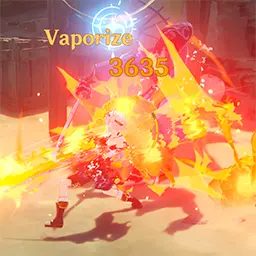
Internal Cooldown in Genshin Impact
This guide explains Internal Cooldown (ICD) in Genshin Impact and the rules governing it. ICD is a more endgame focused mechanic which controls how often an Element can be applied from any attack and ability on your character.
Internal Cooldown (ICD) in Genshin Impact
In Genshin Impact, ICD stands for "Internal Cooldown." It is a game mechanic that controls how often certain types of Elemental Reactions and Elemental Auras can occur.
Specifically, ICD prevents Elemental Reactions like Vaporize, Melt, Overload, etc. from occurring too frequently. It imposes an internal cooldown period after a reaction happens, during which time subsequent reactions of the same type cannot occur.
The purpose of ICD is to prevent players from abusing Elemental Reactions by rapidly applying Elemental Auras. Without ICD, it would be possible to proc reactions like Vaporize or Melt constantly, leading to excessive damage output. Many characters also have aspects of their kit which allow them to not follow the "standard" ICD which allows them to apply their Element more regularly.
Understanding ICD is important for team building and optimizing damage output in Genshin Impact, especially for reaction-focused team compositions. Players need to consider ICD when determining how quickly they can apply Elements to consistently trigger Elemental Reactions.
What Are the Rules of Internal Cooldown (ICD)?
ICD is counted both on a timer and also by the number of hits an attack has dealt to an enemy. With Standard ICD being that you can re-apply an Element after either 2.5s or 3 hits, whichever occurs first.
Listed below are many of the rules governing ICD:
- Your 4th hit will apply the characters Element, but will not reset the 2.5s timer.
- The first hit after 2.5s will apply the element as well as resetting the timer and hit counter.
- Every Skill, Burst and Normal Attack has it's own ICD. While many follow Standard ICD, there are some which do not. For example Xiangling's Skill and Burst have no ICD which is a key reason as to why she is such a powerful character.
- Plunging Attacks have no ICD.
- Generally, ICD is shared between Normal and Charged Attacks for Claymore and Sword characters. But not for Bow, Catalyst and Polearm.
Changelog
- 27 Mar. 2024: Guide added.
This guide has been written by Shikhu (Discord - Shikhu), an avid Genshin Impact player who has been exploring Teyvat since the game has launched. He has experienced all the game has to offer from building his favorite characters, exploring the world to clearing Spiral Abyss each rotation. His favorite character being his C6 Furina.